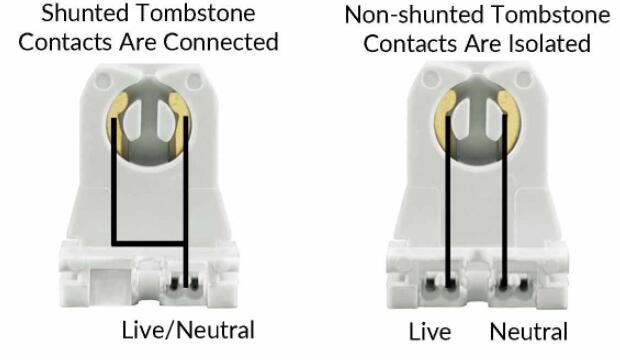Oct. 11, 2019
Tombstones are the "sockets" or lampholders that the LED tube lights will be installed into, providing both the mechanical support as well as electrical current.
Tombstones have two electrical contacts to match the two pins on a fluorescent/LED tube light. The two electrical contacts can either be:
i) not connected to any electrical source
ii) one connected to live, the other connected to neutral
iii) both connected to live or neutral
Picture 2 is called non-shunted, while picture 1 is called shunted.
"Shunting" refers to the joining of two separate circuits into one. The result of shunting is that both tombstone contacts connect to the same electrical polarity.

In general, fluorescent fixtures that have never been altered for LED or instant-start ballasts have non-shunted tombstones,
while those that have been altered for LED or instant-start ballast may have shunted tombstones.
Sometimes, tombstones are externally shunted, as shown in the photo above, where the wire inputs are only open on one side.
In some cases, however, tombstones can be internally shunted, where the wire inputs on both sides are open, but are connected inside the tombstone.
Since some tombstones are internally shunted, visually checking the tombstones does not provide a conclusive result.
We strongly recommend testing the two tombstone contacts with a voltmeter to determine whether a closed or open circuit exists.
A closed circuit will indicate shunted tombstones.
Previous: RCM certificated LED tube from WISCOON
Next: What is the value UGR